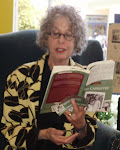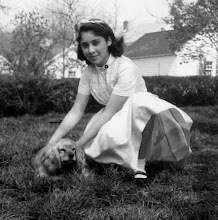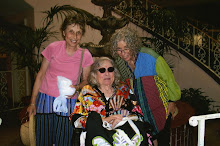My mother never threw anything away, a trait that annoyed me to no end. I'm not talking garbage -- she was fastidious in that respect. We used to tease her about sterilizing the outside of oranges before peeling. But she saved papers, letters, bills, pictures, and receipts. When I could escape her eagle eye, I'd toss out outdated sales slips and the like. Every so often I would say to her, "Why don't we go through all these papers and throw away the ones you don't need." The Queen would always agree. She'd point to a drawer and suggest we start there. One by one, she would study an outdated grocery coupon or a sales slip. On a good day, we might eliminate a quarter of the drawer's contents. I instinctively knew when to leave well enough alone.
Occasionally, she would say, "Let's go through the closet." I always fell for it. I'd pull out a dress that hadn't been worn in twenty years and hold it up. She would consider, then say, "put it back." The closet was a lost cause, but she seemed to enjoy the process.
To be fair, there was one time when her need to hold on to correspondence paid off. When her application for long-term health care was denied, the reason given was she had failed to respond to the renewal letter. Knowing that the letter must be somewhere, she and I went through her piles of folders. There was no letter. I requested a copy. There was no proof that such a letter had ever been sent to her, and after an exhausting battle, the insurance was reinstated.
I did not appreciate the positive aspect of my mother's pack rat mentality until she passed away. My sister and I were left with the daunting task of going through 70 odd years of saved papers. The photographs were easy. We kept the old family pictures, and made copies for relatives. Our mother kept every report card we had received, from kindergarten on, and it was fun to look back and laugh at teacher comments like "lacks self control" or "talks too much."
More interesting, however, were our mother's old college papers. I always knew she was intelligent, but until I read those papers and reports, I did not realize how intelligent she was. She hung on to all the evaluations she received from her superiors when she became a social worker in her mid-life. It goes without saying they were all terrific. It wasn't until I came to the boxes filled with family letters, that I came to fully appreciate her reluctance to part with her papers.
Among the most treasured for me were letters to my uncles (who were in the army) from my grandmother, Jennie, usually filled with humorous descriptions of everyday events. One described a restaurant outing where I was a "perfect lady" while my sister "threw food on the floor and made a fuss which the 'fancy' people didn't like." Another told of my sister's birthday party during which I started a fight with her. "But they kissed and made up," she ended the letter.
Especially poignant were letters from my mother's brothers. Our uncle Moey, a navigator, wrote in detail of his experiences in Italy and North Africa. Uncle Harry wrote funny letters to Barbie and me from the VA hospital.
Perhaps the most meaningful letters my mother saved, were the many ones I wrote to her from college and after. Now, I know what people mean when they talk about revisionist history. There, in my handwriting, is the young, real me. And, my confidences illuminate my relationship to my mother during those, for me, intense years.
To sum it all up, I now firmly believe being a "pack rat" has its good side. My mother left a treasured legacy in those old letters. And, despite how annoyed I used to get at her "clutter," I look through my filing cabinets and boxes stacked in the closet and find that I have held on to all of my daughter's report cards, notes, hand-drawn pictures, toys and baby clothes. I trust that one day she will value them as I do.
Best, Fran
What they're saying about our new book:
"The elderly have quite a bit of wisdom, and often you'll get it whether you want it or not. "Feeding Mrs. Moskowitz & The Caregiver" is a pair of two novellas focusing on the topic of the elderly and their interactions with the people around them. 'Feeding Mrs. Moskowitz' is the story of the titular elderly lady and her encounters with a girl rapidly approaching middle age. 'The Caregiver' tells the tale of a caregiver and her job at an assisted living facility. "Feeding Mrs. Moskowitz & The Caregiver" is an enticing read that shouldn't be missed."
-- Midwest Review of Books
"The novellas are authentic, filled with believable characters and situations that resonate with our own life experiences. The stories are funny and poignant at the same time, teaching those who have not thought much about the aging process in the best way possible by fascinating and amazing us."
-- Anne M. Wyatt-Brown
"As someone who was the caregiver for two aging parents, both of whom lived into their nineties, I found Feeding Mrs. Moskowitz and The Caregiver: Two Stories by Barbara Pokras and Fran Yariv a delightful experience. It is a candid and humorous look at aging. .....It is well work reading whether one is a caregiver or not. This is a slice of life worth visiting."
-- Alan Caruba, Bookviews
"Caring for aging parents is one of the most common experiences sisters share, but few can transform their responsibility into bittersweet words of wisdom the way the Pokras sisters, Fran and Barbara, have done. This book, with its tender, funny, and revealing insights into the world of the elderly, is a must-read for every caretaker." -- Carol Saline, author of The New York Times bestseller, "Sisters"
"The novellas are beautiful little parables that are just not meant for caregivers or for the children of the elderly, bur for everyone -- as most of us will, eventually, take similar journeys to those taken by the residents of Sunset Hills, in one form or another." -- John McDonald, New York Journal of Books, award-winning novelist, screenwriter, playwright and graphic novel adaptor of the works of William Shakespeare.
-- Midwest Review of Books
"The novellas are authentic, filled with believable characters and situations that resonate with our own life experiences. The stories are funny and poignant at the same time, teaching those who have not thought much about the aging process in the best way possible by fascinating and amazing us."
-- Anne M. Wyatt-Brown
"As someone who was the caregiver for two aging parents, both of whom lived into their nineties, I found Feeding Mrs. Moskowitz and The Caregiver: Two Stories by Barbara Pokras and Fran Yariv a delightful experience. It is a candid and humorous look at aging. .....It is well work reading whether one is a caregiver or not. This is a slice of life worth visiting."
-- Alan Caruba, Bookviews
"Caring for aging parents is one of the most common experiences sisters share, but few can transform their responsibility into bittersweet words of wisdom the way the Pokras sisters, Fran and Barbara, have done. This book, with its tender, funny, and revealing insights into the world of the elderly, is a must-read for every caretaker." -- Carol Saline, author of The New York Times bestseller, "Sisters"
"The novellas are beautiful little parables that are just not meant for caregivers or for the children of the elderly, bur for everyone -- as most of us will, eventually, take similar journeys to those taken by the residents of Sunset Hills, in one form or another." -- John McDonald, New York Journal of Books, award-winning novelist, screenwriter, playwright and graphic novel adaptor of the works of William Shakespeare.
Wednesday, March 17, 2010
Subscribe to:
Post Comments (Atom)
My Blog List
Some of our favorites to share:
- Barbara's favorite movies: "Precious" "Inglorius Bastards" "The Orange Thief" (never released theatrically), anything by Frederick Wiseman, and "Stop Making Sense" (I worked on this!)
- Fran likes "ALL ABOUT EVE" with Bette Davis
- Another of Fran's favorites -- FIELDWORK by Mischa Berlinski








No comments:
Post a Comment